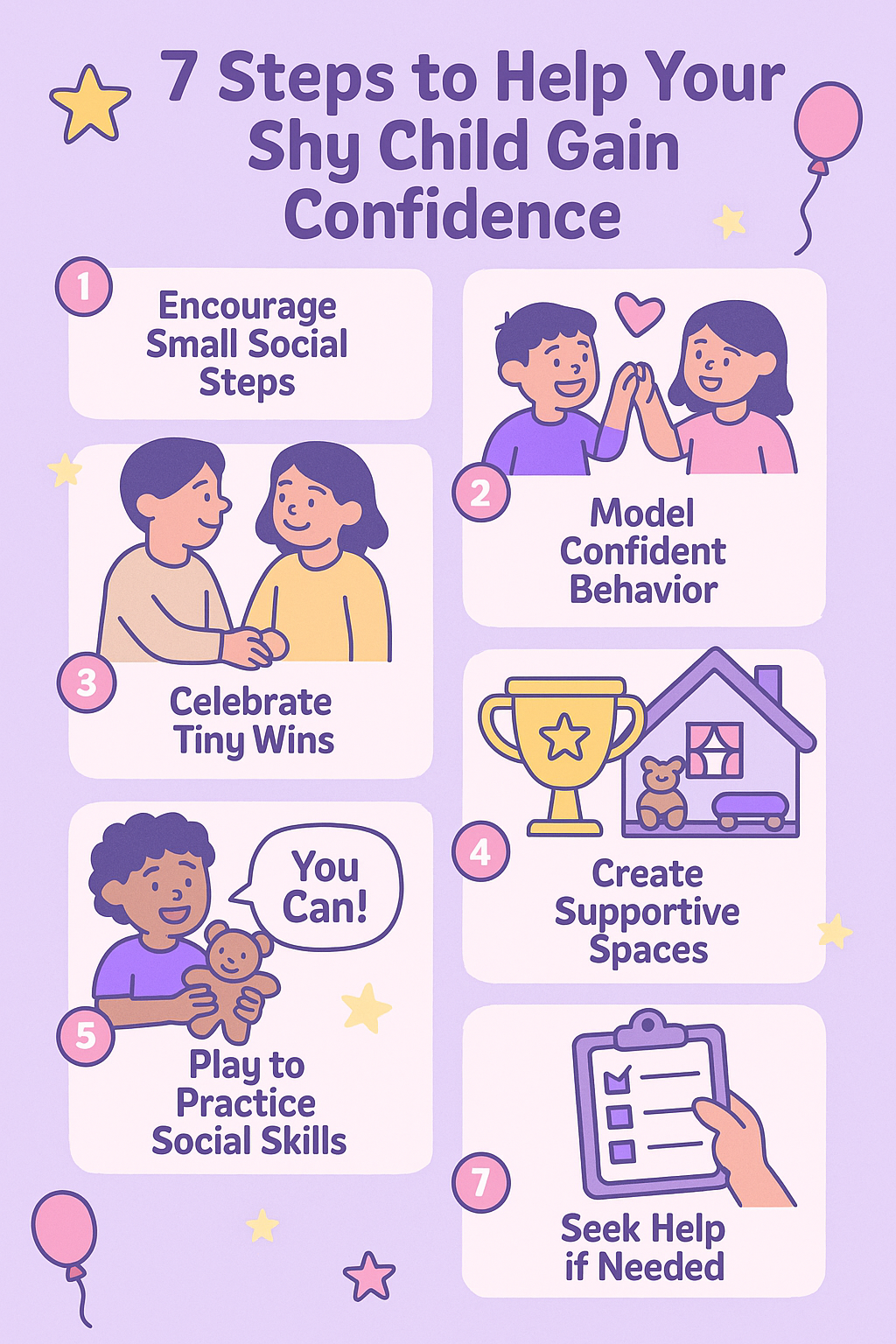7 Powerful Ways To Help Your Shy Child Gain Confidence
Helping a shy child gain confidence can feel like a big task, but with patience, encouragement, and the right strategies, it’s absolutely possible. Many children experience shyness, especially when facing new people, big groups, or unfamiliar settings. With a little support, you can help your shy child gain confidence and navigate social situations with greater ease.
Shyness doesn’t mean something is “wrong” with your child — it often reflects sensitivity, caution, or introversion. By focusing on their strengths and encouraging small steps, you can help your shy child blossom into a self-assured, resilient individual.
Simple activities like role-playing can be powerful tools to help shy child gain confidence in everyday interactions.
Let’s dive into 7 practical ways you can support your child on their confidence journey.
Heads up: This post may include affiliate links. As an Amazon Associate, I earn from qualifying purchases—at no extra cost to you. Full privacy policy and disclosure here.

7 Effective Ways to Help Your Shy Child Gain Confidence
1. Encourage Gradual Social Interactions
For a shy child, jumping straight into a large group can feel overwhelming. Instead, start with small playdates, short group classes, or family gatherings. Over time, these low-pressure situations build familiarity and comfort with social interaction.
🌟 Tip: Praise effort over outcomes. Celebrate when they introduce themselves or speak up, even if it’s just a few words.
If you’re looking for easy ways to help your shy child gain confidence, start with encouraging gradual social steps.
Learn more ways to teach emotional regulation through fun activities here.
2. Model Confident Behavior to Help Your Shy Child Gain Confidence
Children learn by watching. If they see you handling social situations calmly — introducing yourself, making small talk, setting boundaries — they’ll naturally start to imitate those behaviors.
Even small changes in your own posture, tone of voice, and openness can send powerful messages about confidence.
Helping a shy child gain confidence doesn’t happen overnight, but small consistent actions make a big difference.
Explore how parents can support emotional regulation through art activities.
3. Celebrate Small Achievements
Success builds on success. If your child speaks to a peer, raises a hand in class, or orders their own food at a restaurant, celebrate it! These “small wins” help reshape how they view themselves — from “I’m shy” to “I can do hard things.” Celebrate their small efforts as they work to help shy child gain confidence.
🌟 Helpful Resource: For emotional support tools, check out these breathing exercises for kids that help calm nerves before social interactions.
You can help shy child gain confidence by modeling positive self-talk and encouraging self-expression.
4. Provide Supportive Environments
Choose activities, teachers, and settings that are nurturing and encourage personal growth without harsh judgment. Look for extracurricular programs that emphasize teamwork, creativity, and kindness.
🏡 Family Game Night Idea: Use games like Don’t Break the Ice to build social interaction skills in a low-stress, fun way!
Group activities are a fun way to help your shy child gain confidence while developing important social skills.
5. Foster Social Skills Through Play
Role-playing games, imaginative play, and cooperative activities all naturally build conversation skills, leadership abilities, and emotional resilience. Through play, children practice social behaviors in safe, fun settings.
One effective strategy to help shy child gain confidence is to avoid labeling them and instead highlight their strengths.
🎨 Encourage activities like:
- Puppet shows
- Dress-up games (Costumes like this Melissa & Doug Fire Chief Role Play Set)
- Board games with simple turn-taking rules
6. Avoid Labeling Your Child as “Shy”
Even if it’s said lovingly, labeling your child as “the shy one” can reinforce self-limiting beliefs. Instead, frame behaviors positively:
- “You like to take your time meeting new people.”
- “You’re really observant and thoughtful.”
This small language shift empowers your child to see themselves as capable, not confined by a label.
Parents often ask how to help shy child gain confidence at school, and the answer lies in gentle encouragement and safe environments.
7. Seek Professional Guidance if Necessary
If your child’s shyness prevents them from participating in everyday activities, consulting a child therapist or counselor can be incredibly helpful. Professionals can offer customized strategies that suit your child’s unique temperament and needs.
Check out tips on calming emotional outbursts in young children here.
For teens, social media can also play a big role in self-esteem — navigate those tricky waters here.
Remember, the journey to help your shy child gain confidence is about patience, support, and celebrating small wins along the way.
Frequently Asked Questions
What causes shyness in children?
Shyness can be influenced by genetics, early childhood experiences, and personality traits. Some children are naturally cautious and observant, which can sometimes be mistaken for social discomfort.
How can I help my shy child gain confidence at school?
Partner with teachers to create small leadership opportunities, like helping with class tasks. Reinforce their strengths at home and encourage after-school activities that spark their interests.
Are there activities that can boost my child’s confidence?
Absolutely! Activities like drama classes, cooperative board games, and group art projects allow children to practice speaking up and taking risks in a supportive environment.
Should I push my child to be more outgoing?
Encouragement is key — not pressure. Gently invite your child to try new things but respect their comfort level and need for gradual exposure.
When should I seek professional help?
If your child’s shyness causes severe anxiety, isolation, or affects their daily functioning, a mental health professional can provide helpful tools and interventions tailored to their needs.
Support Your Child’s Journey with Helpful Tools
📚 Recommended Books:
🎲 Recommended Games:
👕 Role Play Kits:
Final Thoughts
One of the most important things you can do to help your shy child gain confidence is to celebrate every small victory.
Helping a shy child gain confidence is a journey, not a sprint. Celebrate every small step, model resilience, and provide a nurturing environment where they can thrive.
With your encouragement, you’ll help your shy child gain confidence and face new challenges with courage.
🌟 Ready to Help Your Child Build Confidence One Step at a Time?
Grab your FREE printable checklist — “Today’s Small Step Toward Confidence” — and celebrate every brave moment your child takes toward becoming their most confident self!
✅ Easy daily actions
✅ Kid-friendly and positive
✅ Perfect for home or classroom use
👉
💡 Want to come back to these tips whenever you need a confidence boost for your child?
Save this pin to your Parenting or Kid Activities board on Pinterest — and have these simple strategies ready whenever you need them! 🌟
Because every small step your child takes deserves to be celebrated!


I just wanted to say thank you so much for sharing this amazing resource! Your ‘5 Pillars of Positive Parenting’ PDF has been a game-changer for me and my family. The practical tips and strategies outlined in the guide have helped me become a more effective and loving parent. I’ve already seen a positive difference in my children’s behavior and our family dynamics. So thank you again for creating and sharing this valuable resource with us!
I really appreciated this post. As a parent, it can be hard to know if you’re doing the right thing when it comes to raising confident kids. Your practical advice and personal anecdotes were so helpful and reassuring. It’s great to know that I’m not alone in this journey. Thanks for sharing your insights!
This post was just what I needed! My son, Mason, is about to start a new school and he’s been feeling really anxious about it. Your tips on building confidence through positive reinforcement and encouragement have given me some great ideas on how to support him during this transition. Thank you so much!
I was feeling overwhelmed and stressed out about being a new parent, but after taking the class, I feel like I have a better handle on things. The tips and strategies were practical and easy to implement, and I can already see a positive difference in my relationship with my child. Thanks again for the recommendation!
I absolutely loved this post! My son, Alex, has always been shy and struggled with confidence, but after reading your tips, I feel like I have the tools to help him build his self-esteem. Thank you so much for sharing your wisdom!
Thank you for this wonderful article! As a working mom, it can be tough to find the time to focus on building my daughter’s confidence. But your tips were so practical and easy to implement, and I’ve already noticed a positive difference in her attitude. Keep up the great work!
Hi there! I just wanted to say thank you so much for recommending that free parenting class. I was hesitant to try it out at first, but after taking the course, I can honestly say that it was so helpful! I learned so much and feel much more confident in my parenting abilities. So thank you again for sharing this great resource!